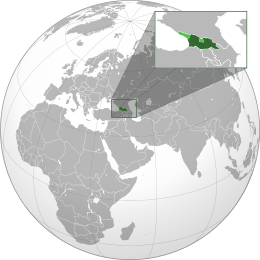More languages
More actions
| Georgia საქართველო | |
|---|---|
 Claimed territories of Abkhazia and South Ossetia in light green | |
| Capital and largest city | Tbilisi |
| Official languages | Georgian |
| Dominant mode of production | Capitalism |
| Government | Unitary parliamentary bourgeois republic |
| History | |
• Sovereignty declared | 26 May 1990 |
• Secession from USSR | 9 April 1991 |
• Secession recognized | 26 December 1991 |
| Area | |
• Total | 69,700 km² |
| Population | |
• 2022 estimate | 3,688,647 |
Georgia is a country in the Caucasus. It is a close ally of the U.S. and participated in the invasion of Iraq with the third largest part of the occupation forces. During the first ten years of its independence, from 1991 to 2001, Georgia received over $1 billion in aid from the United States.[1]
History
Early history
The Georgian Kingdom of Iberia adopted Christianity as its state religion in 319 CE. Bagrat united Georgia and Abkhazia in 1008 and his successors ruled both nations until the Timurid invasion in 1463, when Abkhazia became independent.
After the Russian Empire conquered Georgia in 1801, the Romanovs suppressed Georgian art and culture in favor of the Russian Orthodox Church. After the overthrow of the Romanovs in 1917, Georgia briefly became a German puppet state until being liberated by the Red Army in 1921.[2]
Soviet era
In the 1980s, right-wing nationalist Zviad Gamsakhurdia became the leader of the anti-Soviet counterrevolutionary movement in Georgia. He hated Abkhazians and Ossetians and promoted the slogan "Georgia for the Georgians." In 1989, he and his supporters attempted to storm the South Ossetian capital of Tskhinvali, but Soviet troops prevented them from massacring the Ossetians.[2]
Capitalist era
In 1990, shortly before the dissolution of the USSR, the South Ossetian Autonomous Oblast declared its independence from Georgia. Gamsakhurdia became Georgia's first president in 1991 and attempted to remove South Ossetia's autonomous status and make Georgian the official language throughout the country. Another former region of the Georgian SSR, Abkhazia, also declared independence and has been supported by Russia since 1992. Gamsakhurdia brutally oppressed ethnic minorities until being overthrown by the mafia-led Mkhedrioni militia less than a year after he took power.
After the 1992 coup, mafia boss Jaba Ioseliani became part of a four-person provisional government that also included Eduard Shevardnadze, a follower of Gorbachev.[2]
President Mikheil Saakashvili was put in power in 2004 after the U.S. organized a color revolution known as the Rose Revolution. In August 2008, Georgia bombed South Ossetia. They fired missiles at civilian areas but were quickly driven out by Russian forces.[1]
References
- ↑ 1.0 1.1 Saul Kanowitz (2008-08-15). "Russia, Georgia, and independence in the age of imperialism" Liberation School. Archived from the original on 2021-05-23. Retrieved 2022-06-21.
- ↑ 2.0 2.1 2.2 Evan Reif (2022-11-23). "Georgian Legion Carries Out ISIS-Style Executions in Ukraine—with Covert U.S. Support" CovertAction Magazine. Retrieved 2022-11-23.


